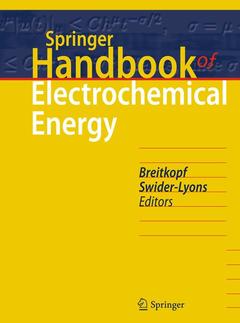Springer Handbook of Electrochemical Energy, 1st ed. 2017 Springer Handbooks Series

This comprehensive handbook covers all fundamentals of electrochemistry for contemporary applications. It provides a rich presentation of related topics of electrochemistry with a clear focus on energy technologies. It covers all aspects of electrochemistry starting with theoretical concepts and basic laws of thermodynamics, non-equilibrium thermodynamics and multiscale modeling. It further gathers the basic experimental methods such as potentiometry, reference electrodes, ion-sensitive electrodes, voltammetry and amperometry. The contents cover subjects related to mass transport, the electric double layer, ohmic losses and experimentation affecting electrochemical reactions. These aspects of electrochemistry are especially examined in view of specific energy technologies including batteries, polymer electrolyte and biological fuel cells, electrochemical capacitors, electrochemical hydrogen production and photoelectrochemistry.
Organized in six parts, the overall complexity of electrochemistry is presented and makes this handbook an authoritative reference and definitive source for advanced students, professionals and scientists particularly interested in industrial and energy applications.
Electrochemical Science: Historial Review.- Modern Electrochemistry.- Part A: Thermodynamics.- Thermodynamical Aspects of Electrochemical Reactions.- Thermodynamics of Electrochemical Systems.- Multiscale Modeling of Solvation.- Part B: Electrodes and Electrode Processes.- Highly Ordered Macroporous Electrodes.- Ion-Sensitive Electrodes.- Transport in Liquid-Phase Electrochemical Devices.- Catalyst Layer Modeling.- Water Management in Proton Exchange Fuell Cells.- Calculations in Li-Ion Battery Materials.- Part C: Electrochemistry Probes.- Electrochemical Energy Generation and Storage as Senn by In-Situ NMR.- Spectroscopy of Electrochemical Systems.- Kinetic Activity in Electrochemical Cells.- Part D: Energy Conversion and Storage.- Lithium-Ion Batteries and Materials.- Materials for Electrochemical Capacitors.- Electrochemical Capacitors.- Kinetics of Fast Redox Systems for Energy Storage.- Modern Fuel Cell Testing Laboratory.- Polymer Electrolyte Fuel Cells.- Next-Generation Electrocatalysts.- Methods in Biological Fuel Cells.- Energy Conversion Based on Bio(electro)catalysts.- Photoelectrochemical Conversion Processes.- Part E: Electrochemical Processes.- Advanced Extractive Electrometallurgy.- Electrodeposition of Nanomaterials.- Electrochemical Hydrogen Production.- Electrochemical Machining Fundamentals.
Cornelia Breitkopf is a Full Professor of in the Department of Mechanical Engineering and Chair of Technical Thermodynamics at the Technical University in Dresden, Germany. Her main research interests are transient methods for the evaluation of transport and sorption parameters of gases in porous media accompanied with the modeling of complex transport phenomena, the theoretical determination of property data, the characterization of solid porous materials, and modeling of silicon wafer structures.
She received her diploma in Chemistry from the Martin-Luther-University Halle-Wittenberg where she continued her research to earn a PhD in theoretical physical chemistry. After a postdoctoral position at the Birkbeck College/University of London, she joined also as postdoc the Environmental Research Center in Leipzig. She was a Guest Researcher at the Environmental Science Center in Peterborough, Canada and at the University of Wisconsin, USA. Following her habilitation, which was part of a priority program of the German Science Foundation (DFG), she was Professor for Chemical Reaction Engineering in Leipzig and Freiberg and then worked as a Senior Scientist at the Technical University of Munich before she was appointed Full Professor in Dresden in 2010.
Karen Swider-Lyons is a Head of the Alternative Energy Section in the Chemistry Division of the Naval Research Laboratory in Washington D.C. She currently leads research programs on advanced battery materials, low-cost catalysts for use in polymer fuel cells, and is studying how fuel cells can be used for long-endurance, energy-efficient unmanned air and undersea vehicles.
Karen Swider-Lyons obtained a PhD in Materials Science and Engineering from the University of Pennsylvania for her work on mixed conducting materials for solid oxide fuel cells. She also holds a BS in Chemistry from Haverford College. In 2010, she received the Dr.
Offers a comprehensive source of all fundamentals of electrochemistry for contemporary applications
Presents a timely and up-to-date reference in a field with increasing industrial impact
Features many applications of electrochemistry in the energy sector and industrial settings
Includes supplementary material: sn.pub/extras
Date de parution : 11-2016
Ouvrage de 1016 p.
19.3x24.2 cm



